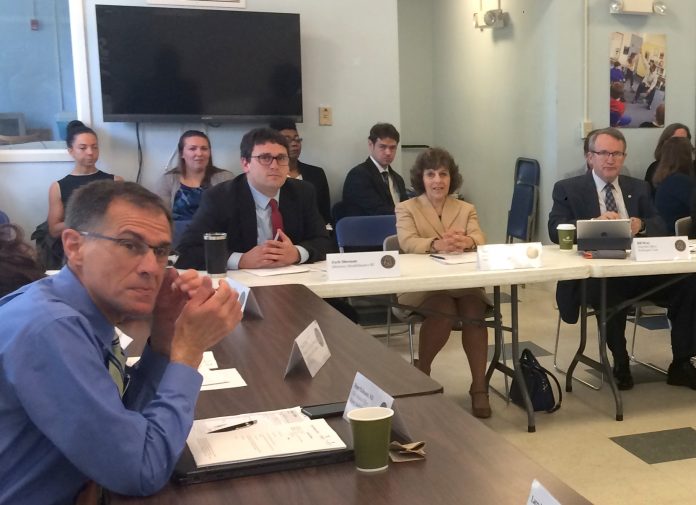
PROVIDENCE — The Market Stability Workgroup is recommending a Rhode Island version of the Affordable Care Act’s individual mandate be enacted sooner rather than later as a number of legislative efforts to preserve ACA protections move through the General Assembly.
The workgroup, organized by the Office of the Health Insurance Commissioner and HealthSource RI, recommends the state level mandate, along with two other strategies to be taken “without delay” to “protect Rhode Islanders from unaffordable rate increases,” according to a draft report on the group’s recommendations discussed at their Tuesday morning meeting at the Institute for the Study and Practice of Nonviolence in Providence. The strategies would not begin to affect rates until 2020, according to the report.
While work will begin immediately on drafting the state version of the individual mandate, it won’t be introduced until next year’s legislative session, said Kyrie Perry, HSRI spokeswoman.
“Further study is needed to figure out how to best implement that,” Perry said.
Termed a “state-based shared responsibility requirement,” the workgroup recommends that the state should create its own individual mandate to purchase health insurance as soon as possible for the sake of continuity, modeled after the federal version.
The federal mandate remains in effect, but with the tax penalty for the uninsured zeroed out starting in 2019 as a result of the Republican tax bill passed in December 2017. For 2018, the penalty for forgoing health insurance, on which the state version would be modeled, is $695 for a full year, or 2.5 percent of household income, whichever is larger. For each child younger than 18 without coverage, the penalty is $348, according to Zachary Sherman, director of Health Source RI, the state ACA insurance exchange.
Without the penalty in effect, Sherman said, he expects more people to avoid purchasing health care insurance as a cost-cutting measure. That will reduce the pool of people buying in to the private health insurance market, particularly the “young invincibles” who help balance out the market’s risk pool since they are healthier and use fewer health care resources, resulting in rising rates.
The report also recommends the state be authorized to submit a 1332 waiver request under the ACA to implement a state reinsurance program to mitigate premium increases in 2020 and beyond. A reinsurance program would offset carrier costs, helping to cover claims costs for the highest cost enrollees with the most unpredictable claims. A reinsurance program would remove some of the risk that carriers otherwise factor into their yearly premium rates.
The third recommendation is to give the Office of Health Insurance Commissioner regulatory oversight authority of short-term limited duration, or STLD, plans to ensure they’re subject to the same consumer protections that apply to all private health insurance coverage. Proposed changes to the ACA, if successful, could make it easier for individuals to join association health plans and purchase STLD plans which lack some ACA protections, such as the requirement to cover essential health benefits, according to the report.
Under a new proposed federal rule, STLD plans will be permitted to be sold for up to 12 months instead of the current three-month limit and may be renewed year-over-year.
On Monday night, the STLD regulation bill (S 2931) providing those protections and the 1332/Reinsurance bill (S 2934) setting up a health care reinsurance program for the state were considered and passed by the Senate Health & Human Services Committee.
Sen. Joshua Miller, (D-Cranston), a member of the group, drafted a Market Stability bill (S 2785A) which was held by the Committee for further study.
Rob Borkowski is a PBN staff writer. Email him at Borkowksi@PBN.com.












